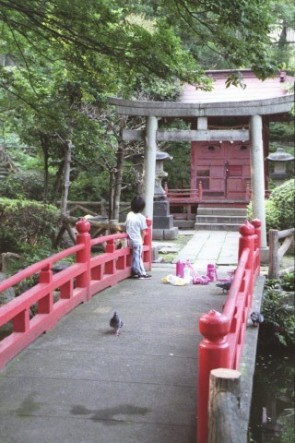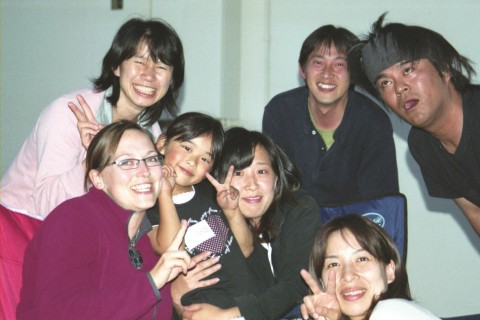I’d encountered this side of Japan before: at the green tea noodle shop in Kamakura, where we sat under a bamboo roof near a little brook and slurped green tea soba noodles; at the ryokan in Shimokita, a typical Japanese inn and hot springs resort, where we slept on futons on the tatami-matted floor; and in Mutsu, my group’s host city, where we spent ten days. It was an appropriate way to spend my last day in Tokyo…and Japan. All of these (and especially Mutsu) are like anti-Tokyos: quiet, decidedly un-hip, and–in the case of Mutsu–a bit of a rural backwater in Japan. Tokyo is bold, bright, and cosmpolitan…fun to explore, but not a place I could love. These other parts of Japan–the quiet and quirky secret corners of Japan–are enthralling. Mutsu, in particular, was a surprising place to fall in love with. It is, after all, a tiny city (pop. 67,000) in the remote Shimokita Peninsula, a three-hour drive from the nearest airport and university. In Shimokita, there are abundant cedar trees and wildlife (including snow monkeys!) and little else. As 20 gaijin descending on this unsuspecting town, we were quite a spectacle. Our first day in town, we made the local newspaper; from that point on, every time we went out we ran into someone who had either seen us in the newspaper, met us at a school, or knew someone who knew someone who met us at a school. We were celebrities! Mike-san, a fortysomething English teacher from New Mexico and member of the Muskogee Indian tribe, was the best at working our celebrity status. Mike made fast friends everywhere, but especially in important places…Mutsu’s bars. Mike befriended Steve, a purveyor who built a bar in his living room, replete with beach umbrellas and Coleman camping chairs. If you went into Steve’s with Mike, you were elevated to demagogue status, which includes free food and rounds of drinks bought by other patrons. On our last day in Mutsu, Steve even got up early to bid Mike farewell with a bag of Asahi beer “for the road. Mike was also beloved by Kumi, an ancient pipsqueak of a woman with a gravelly, bar-tuned voice. Kumi ran a snack bar, Mutsu code for hostess establishment. Aside from Steve’s place, just about every watering hole in Mutsu is a snack bar. What else are you going to do when the winters are long and your only visitors are little pink-butted monkeys?! The thing about snack bars is that, if you can find one that doesn’t employ endentured Southeast Asian child abductees (these I firmly boycotted, even when scoffed at by some men in our group for being “uptight”), they can be quite fun. Every snack is also a karaoke bar, and instead of charging you per drink, they charge you a $20/hour drinking, singing and sitting fee. A good deal! At Kumi’s, the “hostesses” are sixty-something Japanese women who spend most of the evening crooning their favorite Japanese ballads. After they are completely drunk, they may come to your table and try licking the necks of your male companions. Fortunately, they are easily shooed away, just in time for our group rendition of “Sweet Child of Mine.” Every time we tried to sing at Kumi’s, however, she swiftly confiscated the microphone and handed it back to one of her Japanese ladies. With some coaxing, I did convince Kumi to sing a duet with me: “There’s Only One Flower in the World,” by SMAP, the Japanese Backstreet Boys. She sang the words, I hummed “Na Na Na watashi waaaa….” Our days in Mutsu were a little more upstanding. During our school visits, we got to teach English classes, eat lunch with students, and converse with teachers. The elementary school was mind-blowing: the school’s brass band was better than any high school brass band I have ever seen! Also, after lunch, the students clean the school. No janitors employed by Mutsu Public Schools. Rather, students scrub the toilets, polish the floors, and sweep every last particle out of the building. The high school (which also requires its students to clean) was a powerhouse, what you imagine when you think of what a Japanese school is like. The middle school, however, was a regular old middle school: paper balls flying, notes passing, kids flipping under their desks and talking back to their teachers. In the back of one class, I even witnessed a wrestling match that was completely ignored by the teacher! I actually really liked the middle school…felt like home! The highlight of our trip to Mutsu was certainly the home stay. I stayed with Ichiro and Natsuya Inoshita, a young couple with a two-year-old daughter, Manaka. Ichiro is a civil engineer working on the nuclear power plant; Natsuya is a former elementary-school teacher who is now a stay-at-home mom. Most host families took their American guests on a whirlwind sightseeing tour of Shimokita. Not mine. The Inoshitas instead hosted a block party barbeque in my honor. So on Saturday, from 2pm until the wee hours, I sat in the yard with about thirty other Japanese families who spoke varying degrees of English. They prepared a feast for me of fresh grilled scallops, octopus salad, onigiri rice balls, and copious amounts of biru (the most important word in Japanese: beer). At the beginning of the barbecue, it was a little awkward: the adults struggled to find English words while the fifty-some children whisked me around to show me their favorite games and tricks. Eventually, after enough biru, the parents came out of their shells, particularly the moms. Every mom in Japan is a house wife, and this is as much of a state-of-mind as it is a description of how they spend their days. The wives had trouble at first finiding conversational common ground: I’m not married, I don’t have children, I work full-time. And then, they discovered I had a boyfriend. Before you knew it, they were my new best friends, squealing about when we were getting married, what kind of dress I would wear, where would we honeymoon, how many children would we have, what was I going to name those children, and if I could name my children Japanese names, which names would I pick. It was like being at a middle school slumber party! Hiroko, the block lush, was my willing translator. Draped over her lawn chair, drink in hand, she sighed deeply after about twenty minutes of this: “Housewife talk. They are so silly. All they want is babies and more babies. I don’t even like children.” Hiroko, by the way, is the mother to Risa, the most adorable, chubbalicious two-year-old I have ever met. Fortunately, Hiroko’s rueful state was interrupted by shouts of, “Hi! Hanabi!” Or, “Yes! Fireworks!” We ended our evening with sparklers and bottle rockets, which the parents passed out and then sat back and enjoyed while their children blew up everything in sight. Perhaps the best thing about Japan, whether it be in the winding streets of Old Tokyo, in Mutsu’s backwaters, or in the swankest of hotel bars, is the food. I cannot get enough fish and seafood. At one point, I was served a giant bowl of maguro (or tuna) sashimi. Half a pound of raw tun atop a bowl of rice. Heaven. There were people in our group who never ate anywhere but McDonald’s. Man, they missed out on the very reason I came to Japan…tuna and scallops and shrimp and yellowtail and salmon and mackarel and fish roe and snapper and trout and…there’s no going back now. I need to find a fresh fish market to indulge my addiction. Fortunate for me, my love of all things fish was made public, and on the second day of my home stay, Ichiro and Natsuya took me to “Tuna Town,” or Oma, the northernmost point on Honshu. We posed in front of the statues of giant tunas, we stared across the Tsugaru Strait at the mountains of Hokkaido, and we ate more tuna than I ever thought was humanly possible. The Inoshitas kept asking, “You like? Maguro is good?” Amid my tuna-stuffed mouth, all I could answer was, “Oishi,” or yummy. Manaka, their two-year-old laughed, and threw pieces of tuna right at me.
0 Comments
Leave a Reply. |
AboutWhile living in Mexico, I joked that speaking Spanish forced me to be far more Zen about life: Since I could only speak in the present tense, I was forced to just live in that present tense. Archives
October 2023
Categories
All
photosLike what you see? That's mostly Ross Freshwater. Check out my talented partner-in-life's photo gallery. |


 RSS Feed
RSS Feed